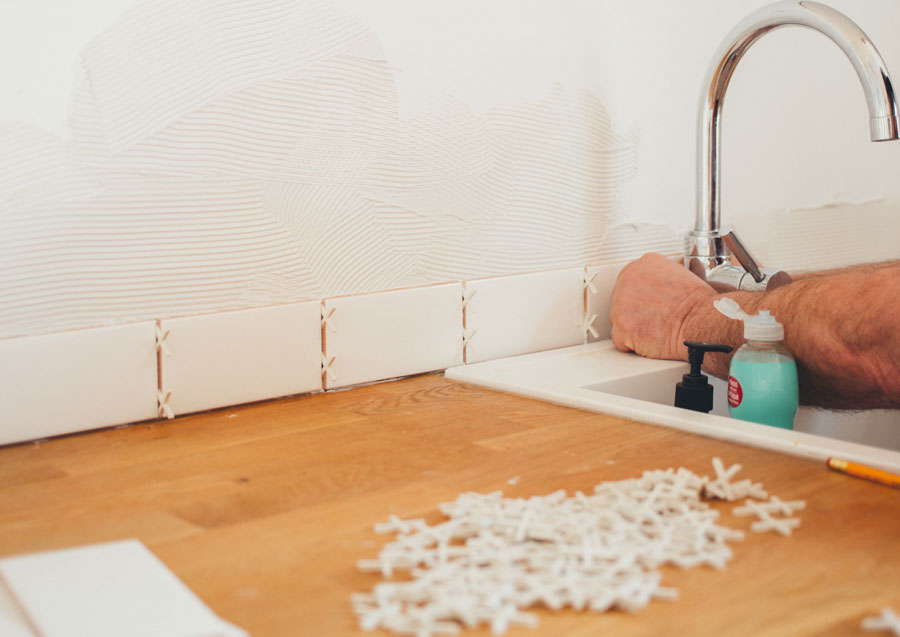Is mortar the same as grout?

This is a question our team here at Jaybro have frequently been asked. While the simple answer is 'no', we appreciate that much more detail is required to fully appreciate the specific, and important, differences between the two.
Let's start with clear definitions
Both are certainly cement-based products, and each has specific properties which makes them the best choice for different activities. We'll look at these later. Meanwhile, to those definitions:
- Mortar is a thick paste used to bind surfaces together. A mixture of cement, sand and water, it is most frequently used as an adhesive binding material between brick, stones or concrete in building work.
- Grout is a much more viscous material and can be used as a binder but not as an adhesive. It is used to fill joints or spaces between ceramic or stone tiles. Mortar can keep tiles and pavers in place.
Key differences between mortar and grout
With the basic definitions in place, let's now investigate some of the key differences between how these material are made and used.
Materials and ratios
Both offer a combination of cement, sand, and water. Mortar also uses lime; whereas grout can also use acrylic, polymer and epoxy. Of the two, the water to cement ratio is lower in mortar.
This, therefore, means that it is also a stiffer material than grout.
Mortar is usually the colour of cement, while grout can be produced in a wide range of colours to suit many specific locations or requirements.
Their primary functions, and how easy they are to use
Mortar acts as a binder in brick or stone masonry projects; grout works as a filling material for gaps or cracks.
Grout is difficult to handle using tools such as a trowel, because of its higher water content, as mentioned previously.
Mortar, on the other hand, holds well when used on a trowel and offers increased workability due to this.
Some key properties - and what this means in use
Viscosity is a measure of the resistance to flow. Grout is much more viscous and fluid than mortar. Not surprisingly, mortar is also non-porous whereas grout can hold water in it even after it has hardened or cured.
Curing is a chemical process that leads to toughening or hardening. With mortar, this involves the provision of adequate moisture, plus the temperature and time to allow it to reach its desired state.
Grout, however, does not need extra water - the initial quantity is enough for its hardening process to be completed. This means that grout sets more quickly than mortar does.
Key applications for each material
As well as its use as a bonding material in brick, stone or concrete masonry, mortar can also be used when plastering to mask the joints and improve the final appearance of the area being worked on.
Grout, which is commonly used as a filler between tiles and for cracks, has also been used for projects such as the strengthening of ground for dam foundations. There are specialist grouts that are designed for super high strength applications and underwater applications.
Grouting also helps avoid cracks or bedding planes (a surface that separates one stratum or layer from another) in weak areas.
Making the choice between grout and mortar
The above comparisons should help you in making a choice between grout and mortar for a building or improvement project. It pays to remember the basic difference that mortar is intended to be used to stick one material or surface to another whereas grout is a filler that is intended to flow.
Both mortar and grout come in a range of variations.
If you are not sure which would be best for your project, then it pays to consult with an experienced professional to make the best selection. It's important to realise that making the wrong choice can cause serious problems as time passes.
Professional advice from the team at Jaybro
With more than two decades in this business, we take the time and effort to make sure that our team is well-versed in our products and how they can best be used.
With a range of different structural, rapid-set, and repair mortar products available and many grouting possibilities, discussing your needs with our friendly team makes good sense. Of course, we also carry a huge range of tools and implements, such as mixing paddles, fillets, trowels, floats and buckets to help you undertake any grouting or mortar work.
If you have any questions about your project and the products you need, we are always ready to help. Simply call our team on 1300 885 364 now.
 Sign In
Sign In 

